China’s African Misadventures (Chinese Belligerence) - Foreign Affairs - Nairaland
Nairaland Forum / Nairaland / General / Politics / Foreign Affairs / China’s African Misadventures (Chinese Belligerence) (2532 Views)
Resism In China, African Student Seeks Support ! / China Lands First Jet On Aircraft Carrier - Is This The Chinese Century? / "Chinese Have No Souls" -- The Experience Of A Ghana Man In China (2) (3) (4)
| China’s African Misadventures (Chinese Belligerence) by strangleyo: 3:17pm On Sep 20, 2009 |
http://www.newsweek.com/id/72028 The town of Catumbela, in Central Angola, sits on a sprawling, fertile plateau planted with plantains and mangos. At the far end of town is a defunct paper mill. There, for several months earlier this year, a group of Chinese railway engineers and laborers camped out in the shadow of two idle smokestacks. The team was one of several sent to this isolated stretch of Angola's interior to build a railroad that will one day connect the African hinterlands to the Atlantic port city of Lobito, several hundred miles to the west. It's a $2 billion project and a colossal dream—a way to bypass Angola's sparse, decrepit roads, which like so many in Africa are strewn with land mines and liable to be washed out by flash floods. There's only one problem: work has stalled. Along the railroad line at least 16 camps that once bustled with Chinese workers and equipment have been abandoned or shut down completely. In those that remain, row upon row of front-loading bulldozers, steamrollers and forklifts sit unused under the sleepy eyes of Angolan soldiers. And the Chinese? "They're gone," says a scrawny guard at the entrance to Catumbela's paper mill, as he stares disconsolately at the tracks. "I don't know when they're coming back—they ate their dogs and left." Africa has rarely been kind to the grand visions of others—whether Dr. Livingstone or Bono. The Chinese are finding, to their surprise, that they're no exception. The Lobito railroad has fallen victim to a high-level dispute between the Angolan and Chinese governments. So have dozens of other deals, including another $2 billion contract, to build an oil refinery in Lobito. The American Embassy says that project will now most likely be awarded to Bechtel. "The Chinese thought they'd come in here and make a killing," says a Western diplomat in the capital, Luanda, who was not authorized to speak on the record. "Now they're facing the reality—it's hard to do things here." Overall, China's push into Africa has been remarkably successful. Chinese companies are sucking up oil from Sudan, cutting down timber in Guinea and mining copper and zinc from the Congo. Beijing recently bought a major stake in South Africa's Standard Bank to fund infrastructure projects throughout the continent. And the Chinese are far outpacing their Western rivals. China has opened more embassies in Africa than the United States has, and is even investing heavily in countries, like Rwanda, where the immediate returns are murky at best. Last year trade between Africa and China topped $50 billion. By 2010 it's projected to reach $100 billion. But all that money—China has extended $11 billion in loans to Angola, more than the World Bank—doesn't mean the Chinese working in Africa are insulated from the continent's troubles. Kidnappings, killings and death threats have plagued Chinese workers from the Niger Delta to the eastern reaches of Ethiopia, where rebels ambushed and slaughtered 17 Chinese oil workers last year. Angola is now China's biggest supplier of crude oil, and Chinese money helped propel the local economy to a 24 percent growth rate last year. But it's also a chaotic, corrupt country that has only recently emerged from a vicious civil war. For Chinese businessmen and workers, it's turning out to be a sobering, even dangerous place. Chinese laborers are venturing deep into the lush Angolan countryside, not just the capital and larger cities. Tens of thousands of Chinese-made PMN-2 mines are still buried there, remnants of the Angolan civil war, which killed more than a million people. De-mining crews are digging the explosives out of the ground, but nowhere near fast enough for the Chinese. So the foreigners improvise. "With a front loader we push the dirt and if there's a mine there it explodes," says Zhou Zhenhong, manager of Kaituo Construction and Enterprises. "It's faster that way, and less expensive than being late." The costs, however, can be more than monetary: on Oct. 24 a Chinese laborer for the Chinese telecom giant Huawei was digging a trench for fiber-optic cable near the southern town of Benguela when a mine exploded, killing him. Two co-workers were also injured. "We've tried to tell them to be careful and they just shrug their shoulders," says Rebecca Thompson, who directs a Norwegian de-mining NGO in Luanda. Western executives—hidden behind the walls of their villas—have bred a certain kind of resentment in Africa. In Angola the much more numerous and adventurous Chinese are suffering from another. Perhaps as many as 100,000 Chinese workers have spread out across the country, many breaking rock on highways or pouring concrete at construction sites. Most live in isolated camps. Few speak English; fewer still speak Portuguese. State-owned Chinese companies prohibit any type of fraternization between their employees and Angolans. If a worker becomes romantically or sexually involved with a local, he's quickly hustled back to China. "Africans and Chinese think differently," says Xia Yi Hua, a regional director for China Jiang Su, a massive construction conglomerate with offices across Angola. Xia has been in the country for four years, and his company still sends him shrink-wrapped packets of Chinese food from back home, along with regular sets of chopsticks. Everything in his office comes from China. One coffee table is made of Angolan wood, he admits, but he flew in a Chinese carpenter to fashion the table. Racist stereotypes are common: both sides accuse the other of looking or behaving like monkeys or pigs. The Angolans claim (without good evidence) that the Chinese eat their dogs. At most work sites Chinese supervisors oversee black laborers, which has created friction. "You Chinese come to Angola and order us around, but in your own country you are suffering," says an Angolan who works for a Chinese company. (He asked not to be named for fear of losing his job.) At one Chinese-run construction site NEWSWEEK visited, hungry workers begged for food, saying their Chinese bosses never fed them. (The bosses say that's not their responsibility.) Angolans laying fiber-optic cable for Huawei near Benguela say they must dig 16 feet a day, or else they won't be paid their $5 daily wage. They claim their Chinese bosses only use one Portuguese word, cavar, which is repeated again and again: dig, dig. The tensions go all the way to the top of the food chain. The Chinese say Angolan government funding for the Lobito railroad has dried up mysteriously; the Angolans say the Chinese stopped working because of mines along the route. Western diplomats in Luanda, who customarily speak only on condition of anonymity, suspect that the dispute has to do with kickbacks but cannot prove anything. They say that the government's finances are incredibly murky, and its dealings with the Chinese murkier still. "Is it all getting stolen? I don't think so," one Western diplomat says of the billions in oil money flooding into Angola's treasury. "[But] it's not clear to me that there's anyone in the government who can actually tell you where all the money is. If there is, it's going to be somebody like Al Capone's bookkeeper." Even China's success in Angola is creating headaches for its businessmen. The handful of business hotels in Luanda are booked months in advance. Good luck finding a cab—the city has only one official taxi service—or renting a car, which can go for as much as $12,000 a month. Rents for houses in Lobito are double that. The extremes of poverty and wealth are deep, and worrisome. Where there are roads in Luanda—much of the city remains a hive of rock-strewn dirt tracks—they are choked with bright yellow Hummers and souped-up Chevy Blazers. Chinese-built mansions for Angolan ministers loom grotesquely on Luanda's hillsides, just above shantytowns where millions of refugees took up residence during the worst years of war. For Mr. Li, a local director for the Guang Xi construction company, the boom is a mixed blessing. Li, who asked that only his last name be used, lives in a cavernous supermarket warehouse in Lobito, with sheets hung on clotheslines to create sleeping areas for his 20 workers. He spends much of his time slogging around the city, begging for the cement his crew needs to build bases for cell- phone towers. On a recent day visiting potential suppliers, he returned long after dark with 12 small bags of cement, all bought at retail prices. "Everything is waiting, waiting," he says, worried about the pace of his project. A Brazilian company has promised to build two new cement factories in Luanda, but so far work hasn't begun. Beijing takes the long view in Africa, figuring its investments now are building good will for the future. But every economy the Chinese help revive becomes that much more attractive to their rivals, too. Already American firms Bechtel and KBR are bidding for infrastructure projects in Angola. Oil giants ExxonMobil and Chevron are increasing their presence in the country. The Brazilian firm Odebrecht is building a highway to compete with the Chinese railroad to Lobito, South African companies are repairing the electrical grid near the oilfields in northern Angola, and the Portuguese are horning in on construction projects in and around Luanda. "In this country, you can get projects for $10 million and do $1 million in profit," says Zhou Zhenhong, the construction executive, over lunch at a seaside restaurant in Lobito. For that kind of money, a lot of people will be willing to put up with the same hassles as the Chinese. China is sucking Africa dry of resources and creating further imbalances. The yellow man does not care for what happens to the Africans inhabiting these lands. |
| Re: China’s African Misadventures (Chinese Belligerence) by blackspade(m): 11:34pm On Sep 20, 2009 |
This article is old, many of the problems with those investments have already been sorted out. I go to this website called SkyscraperCity where there's a lot of news about Angola. I've seen pictures of those things under construction. The West and their sinophobia never fails to amaze me. Chinese investment into Africa is a good thing that benefits both parties. Angola has changed so much, you wouldn't believe your eyes. [size=75pt]56K WARNING!!![/size] |
| Re: China’s African Misadventures (Chinese Belligerence) by Nobody: 1:09am On Sep 21, 2009 |
Compared to the chinese "misadventure" in Africa, white adventure in Africa has been an unmitigated disaster that we are likely never to recover from. So much for Newsweek. |
| Re: China’s African Misadventures (Chinese Belligerence) by Epiphany(m): 5:09pm On Sep 21, 2009 |
davidylan: So upsetting, too upsetting. Makes me think that Africa and Africans are too damn stupid. For too long, we have allowed these parasites come into our land to suck us dry, while using our money and resources to develop their own lands. Can you imagine that after the 'white' men have come in and done their own, it is the turn of the so called 'elite asians' (of which the chinese are the worst) to come in for their share now? By elite asians, i mean the Chinese (Huawei, ZTE, Railway contractors, Oil companies), Indians (mittal, Tata, IT companies, Telecoms), Koreans (Daewoo Heavy Industries, LG) and others. Can anyone give me the name of one, JUST ONE AFRICAN company operating in any of these countries or anywhere in Asia? Or name one African country that is CONTRACTED by any Asian government to help with development or infrastructure building? Stupid Africans (before anyone starts crucifying me for calling us stupid, i am an African too) |
| Re: China’s African Misadventures (Chinese Belligerence) by strangleyo: 6:28pm On Sep 21, 2009 |
blackspade: Wrong!!! Angola is now becoming the Nigeria of the 60s when oil was discovered. Luanda — A chauffeur guides a shining 4x4 BMW out of a gated condominium, ferrying a smartly-dressed executive and her three uniformed children out into another morning in the Angolan capital, Luanda. http://allafrica.com/stories/200909170712.html Epiphany: Abselutely right. I agree with you fully on that. Its like with every generation since the old Mali and Yurobo empires that we're getting dumber and dumber. |
| Re: China’s African Misadventures (Chinese Belligerence) by blackspade(m): 7:31pm On Sep 21, 2009 |
Angola is waaaay different than Nigeria. I would compare it with the likes of Brazil in the 90s. |
| Re: China’s African Misadventures (Chinese Belligerence) by strangleyo: 7:41pm On Sep 21, 2009 |
blackspade: That's an absurd comparison. Brazil's economy in the 90s was diversifying and wealth was starting to trickle down. The gap between the rich and poor had begun to narrow. Angola's economy is stratifying itself exclusively into oil while other sectors are neglected, and the gap between rich and poor is widening. |
| Re: China’s African Misadventures (Chinese Belligerence) by strangleyo: 9:29pm On Sep 21, 2009 |
Adding to that, Angola's president has been in power for well over 30 years and is corrupted to the bone. Under his rule there has never been a free and fair election. Brazil in the 90s? |
| Re: China’s African Misadventures (Chinese Belligerence) by blackspade(m): 10:37pm On Sep 21, 2009 |
Sorry, I was only thinking of the wealth gap. I admit to my foolishness. |
| Re: China’s African Misadventures (Chinese Belligerence) by blackspade(m): 10:44pm On Sep 21, 2009 |
I still think Angola has made a tremendous turn around from 30 years of civil war. Not even a decade ago, that country was absolutely ruined. Now they are rebuilding like crazy, and its only been 7 years. I think people need to give them more time to mature, the country was devastated with almost a million people killed. Look at this forum: http://www.skyscrapercity.com/forumdisplay.php?s=&forumid=1479 This thread would be a good one to look into also: http://www.skyscrapercity.com/showthread.php?t=420119 (Read at least 10 pages, amazing, and 99% of it is happening, not talk like in Nigeria) Not only is there a construction frenzy catering to the rich and middle classes, the government is building a million social houses for the poor, constructing hundreds of health posts and they have a program called "water for all", which is intended to make sure 100% of the urban population has access to fresh tap water by 2015, and the rural population 100% by 2020. The government is also investing like crazy into agriculture. $6 billion dollars alone in from 2008-2011. I think they are doing better than Nigeria to be honest. |
| Re: China’s African Misadventures (Chinese Belligerence) by blackspade(m): 6:15am On Sep 22, 2009 |
[size=16pt]THIS THREAD WILL BE BOMBED WITH BEFORE AND AFTER PICTURES OF ANGOLA TOMORROW. REMEMBER, THEY'VE ONLY BEEN REBUILDING SINCE 2002[/size] |
| Re: China’s African Misadventures (Chinese Belligerence) by strangleyo: 12:55pm On Sep 22, 2009 |
Pretty skyscrapers don't make a equitable or functioning society. Skyscraper city forum is very selective of the pictures that are posted. People are given temporary bans if they post the pictures of areas where the 'masses' live. |
| Re: China’s African Misadventures (Chinese Belligerence) by blackspade(m): 9:52pm On Sep 23, 2009 |
[size=16pt]EXAMPLE 1: HUAMBO - This city was the completely destroyed during their civil war. Look how it looked in 2006:[/size]    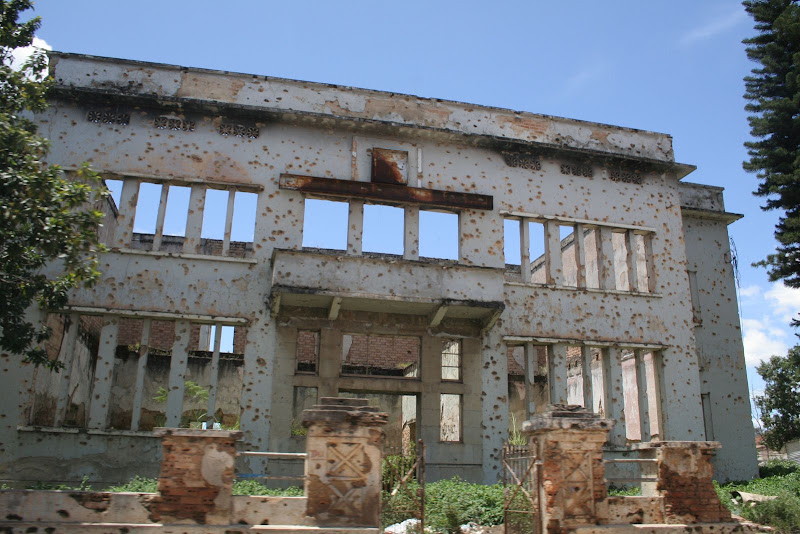  [img]http://www.abload.de/img/huambo-36b0fe.jpg[/img]      [size=16pt]AFTER: In just three years, look at the changes (construction everywhere):[/size] [img]http://www.portalangop.co.ao/motix/pt_pt/files/image/1,1024120a-d156-484a-b74f-7c786a3a30db.jpg[/img]   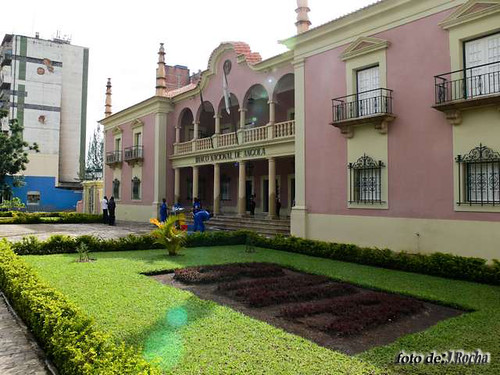 [img]http://www.abload.de/img/huambo-34s7qw.jpg[/img] [img]http://www.abload.de/img/huambo-131i5u3.jpg[/img]  (see this, it's called maintenance, something you rarely see anywhere in Africa)   (One of the many new grocery chains that have been started in Angola through a government progrem. This chain "Nosso Super" is in the process of being privatized.) 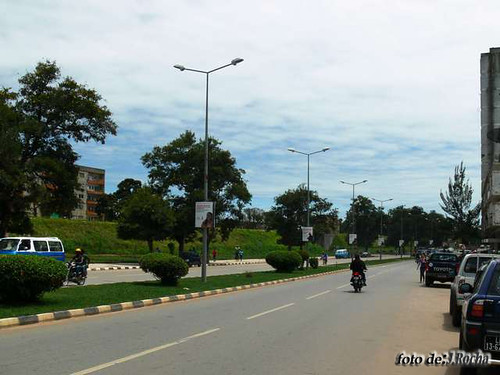  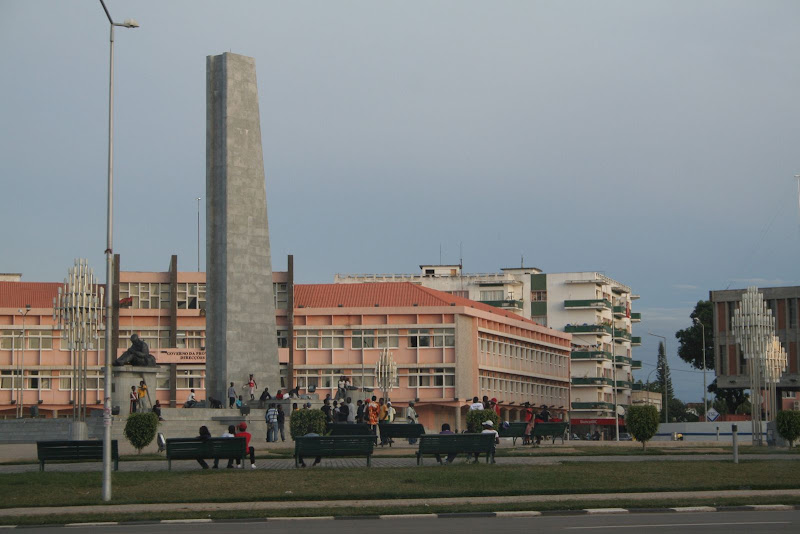  [img]http://www.portalangop.co.ao/motix/pt_pt/files/image/1,d70deda9-eb93-4be7-9dc1-1993a8c76b42.jpg[/img] 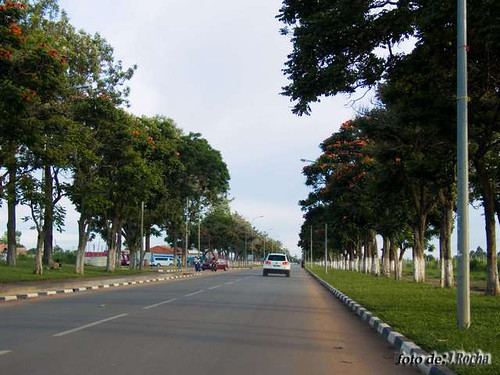 [img]http://3.bp..com/_iMuFEzJUlu0/SdNQOa2IBDI/AAAAAAAAHSQ/aWLNh8fUtlg/s1600/Huambo-31.jpg[/img] [img]http://3.bp..com/_iMuFEzJUlu0/Se5HIQuxdYI/AAAAAAAAIgE/PPndzNwLQaU/s1600/Huambo-27.jpg[/img]  [img]http://3.bp..com/_iMuFEzJUlu0/SiB8gCZAnTI/AAAAAAAAKOs/zfYRK2akIs8/s1600/Huambo%2B-%2B47.jpg[/img]  [size=20pt]Chinese "misadventures?"[/size] |
| Re: China’s African Misadventures (Chinese Belligerence) by blackspade(m): 9:54pm On Sep 23, 2009 |
[size=16pt]EXAMPLE 1: HUAMBO - This city was the completely destroyed during their civil war. Look how it looked in 2006:[/size]         [img]http://www.abload.de/img/huambo-36b0fe.jpg[/img]      [size=16pt]AFTER: In just three years, look at the changes (construction everywhere):[/size] [img]http://www.portalangop.co.ao/motix/pt_pt/files/image/1,1024120a-d156-484a-b74f-7c786a3a30db.jpg[/img]    [img]http://www.abload.de/img/huambo-34s7qw.jpg[/img] [img]http://www.abload.de/img/huambo-131i5u3.jpg[/img]  (see this, it's called maintenance, something you rarely see anywhere in Africa)   (One of the many new grocery chains that have been started in Angola through a government progrem. This chain "Nosso Super" is in the process of being privatized.)     [img]http://www.portalangop.co.ao/motix/pt_pt/files/image/1,d70deda9-eb93-4be7-9dc1-1993a8c76b42.jpg[/img]    |
| Re: China’s African Misadventures (Chinese Belligerence) by blackspade(m): 9:58pm On Sep 23, 2009 |
[size=16pt]HUAMBO CONTINUED: Look at this street, this is how it looked in 2007 (hardly 2 years ago)[/size]  [size=16pt]SAME EXACT SPOT IN 2009:[/size]  |
| Re: China’s African Misadventures (Chinese Belligerence) by blackspade(m): 10:02pm On Sep 23, 2009 |
[size=16pt]HUMABO CONTINUED: The changes are drastic![/size] [size=20pt]Misadventures?[/size] |
| Re: China’s African Misadventures (Chinese Belligerence) by blackspade(m): 10:13pm On Sep 23, 2009 |
[size=16pt]BEFORE ANYONE STARTS CRYING ABOUT THE POOR PEOPLE, READ THIS:[/size] The government started to build houses under the Angola Youth programme, which aims to build one million social housing units by 2012. Following the September elections, the Ministry of Urban Affairs and the Environment became the Ministry of Urban Affairs and Housing. In October the UN World Habitat Day celebrations were held in Luanda. During these celebrations the government undertook to commit more than 10 per cent of oil income to social housing. [size=16pt]The Angolan and Chinese governments have partnered together to build ONE MILLION social housing units all across Angola by 2010.[/size] [size=20pt]The biggest social housing project in AFRICA is under construction right now in Luanda, Angola:[/size]  [size=20pt]As you can see, they are not just moving the poor to an area to where they'll just make another slum, they're providing these people with jobs and adequate services. [/size] Here are construction pictures: [img]http://www.abload.de/img/luandastadium0175cu6.jpg[/img] [img]http://www.abload.de/img/luandastadium018di1k.jpg[/img] [img]http://www.abload.de/img/luandastadium019mhi1.jpg[/img] [img]http://www.abload.de/img/luandastadium020fggs.jpg[/img] [img]http://www.abload.de/img/luandastadium0237i6k.jpg[/img] [img]http://www.abload.de/img/luandastadium022wiyq.jpg[/img] [img]http://www.abload.de/img/luandastadium021eg68.jpg[/img] [size=30pt]Chinese misadventure?[/size] |
| Re: China’s African Misadventures (Chinese Belligerence) by blackspade(m): 10:16pm On Sep 23, 2009 |
Ignore. |
| Re: China’s African Misadventures (Chinese Belligerence) by blackspade(m): 11:18pm On Sep 23, 2009 |
Really interesting article by BBC: [size=15pt]Dos Santos - Angola's silent leader[/size] Jose Eduardo dos Santos is marking 30 years at the helm of Angola. He has presided over and ultimately won a long civil war and shows no sign of stepping down. The 67-year-old is now Africa's second-longest serving leader after Muammar Gaddafi of Libya, following the death of Gabonese leader Omar Bongo in June. But unlike the flamboyant Col Gaddafi, Mr dos Santos shuns the limelight, rarely making public appearances, and he refuses all interview requests from international media. When he travels outside his vast presidential palace in the capital, Luanda, he does so surrounded by a mass of heavily armed soldiers and roads are closed beforehand to allow his free passage. As head of the armed forces, and the police, and through his chairing of the government's cabinet meetings and his appointments of senior judges, he retains a firm grip on all aspects of power in his country, and much of the country's media is also under state control. 'Political craftsmanship' In the July 2009 issue of the Review of African Political Economy, Alex Vines, director of Regional and Security Studies at London think-tank Chatham House, describes Angola's leader as "an accomplished and shrewd economic and political dealmaker with an instinct for political survival". He said: "Against all odds, he has remained in power since 1979, overcoming challenges of war, elections and at the same time displaying a highly refined political craftsmanship." Mr dos Santos has been credited for his attempts at negotiations with ex-rebel group Unita through the conflict years and in particular the speed in which the Luena protocol ending the war was signed following the death of Unita leader Jonas Savimbi in 2002. And while the length of Mr dos Santos' long rule may be questioned by opposition and rights groups - who say he is deliberately delaying presidential elections to prolong his rule - to foreign investors tired of upheaval in places like Nigeria, his three decades of power is an attractive sign of stability. This continuity has been credited for Angola's impressive post-war economic boom, its annual double digit GDP (Gross Domestic Product) growth and the billions of dollars of foreign investment helping to reconstruct the country after so many years of civil war. Among Angolans themselves, the president also appears to be extremely popular, with his MPLA storming to victory in the 2008 parliamentary elections - the first to be held in 16 years - winning more than 81% of the vote. 'Very complicated' Earlier this month he made a rare trip outside Luanda to the coastal city of Benguela, to open a new bridge and visit one of the new football stadiums to be used in the Africa Cup of Nations which Angola is hosting in January. Thousands of Angolans turned out to line the streets, waving flags and cheering. Many ordinary people are ambivalent to the amount of time their president has been in power. History student Machado Mendes, 26, said: "It's a very complicated situation. Angola spent a very long time at war, during which it was impossible to have regular democracy." Isabel Marcelino 30, a nurse, added: "I think it's better for our country that he's in power this long because if we had a new president, they wouldn't know how to organise the country. "Some people the president is doing nothing, but that's not true, every day that passes our country gets better." During recent celebrations for the president's 67th birthday, state media was full of dedications and praise from politicians, army chiefs and MPLA members home and abroad, and there were parties and seminars dedicated to studying his strategies and vision. Few publicly criticise the president or the government and independent journalists who express their opinions can risk criminal proceedings. 'Dynasty' However, there is a growing discontentment within academic and opposition circles over allegations of misappropriated riches among the president's family and inner circle. Some have compared his presidency to a "dynasty". "What we are seeing today in Angola is a small minority of people getting richer while there is a majority of people getting poorer and poorer and poorer," said Unita spokesman Alcides Sakala. Indeed, while Angola has enjoyed rapid economic growth and vies with Nigeria as Africa's largest oil producer, two-thirds of the country still live in poverty and one in six children die before their fifth birthday. Education and health services remain weak and more than half of the population have no access to sanitation. President dos Santos has publicly acknowledged these challenges but the party line is that change cannot happen over night and will only come through long-term strategic investment to create jobs and rebuild war-damaged infrastructures. More than one-third of this year's $33.3 billion budget will be spent on social areas like health and education and there is a pledge to build one million new homes by 2012. Fond of music and football, the president is married to Ana Paula dos Santos, who is 18 years his junior and has several children, a number of whom have significant business interests in Angola and Portugal, the former colonial power. http://news.bbc.co.uk/2/hi/africa/8263352.stm ------------------------------------------------------------------------------------------------------------------------------------------------------------------------------------------------------------------------- This article was fairly balanced in my opinion. This country just started rebuilding in 2002, so the criticisms can be justified in my opinion. Nothing is perfect, especially after 30 years of civil war. Even though there are some obvious elements of corruption, I think he has done a good job at rebuilding his country and putting money in many important areas. He has certainly managed Angola's oil monies better than any country I've seen in Africa. The people of Angola are seeing the changes taking place in their country, which is why they love him. I'd much rather choose to live in a country whose government is a functional autocracy over a country that has a very flawed democracy. |
| Re: China’s African Misadventures (Chinese Belligerence) by blackspade(m): 11:19pm On Sep 23, 2009 |
[size=20pt]TO BE CONTINUED. . . .[/size] |
| Re: China’s African Misadventures (Chinese Belligerence) by strangleyo: 3:03pm On Sep 26, 2009 |
Pretty buildings a country do not make. I'd like to know what the job market it, services, sanitation, government transparency, etc. |
(1) (Reply)
Interesting Facts About Gaddafi / Canadian City Fort Mcmurray Looks Like A War Zone After Being Ravaged By Fire / #coronavirus: See How Russian President, Vladimir Putin Hold Meeting (funny Phot
(Go Up)
| Sections: politics (1) business autos (1) jobs (1) career education (1) romance computers phones travel sports fashion health religion celebs tv-movies music-radio literature webmasters programming techmarket Links: (1) (2) (3) (4) (5) (6) (7) (8) (9) (10) Nairaland - Copyright © 2005 - 2024 Oluwaseun Osewa. All rights reserved. See How To Advertise. 129 |